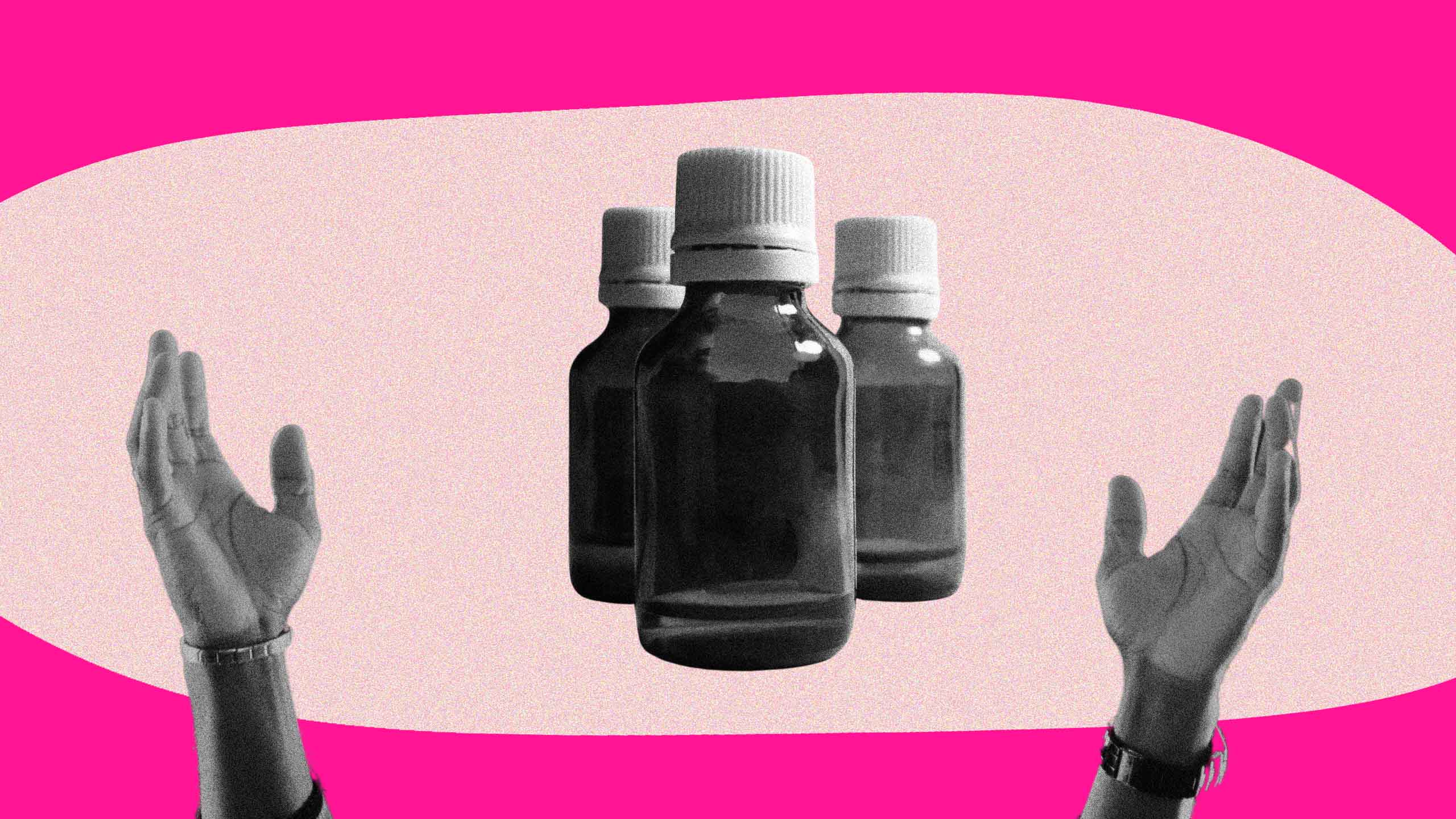At a recent housewarming party for a married couple I’m close with, we went around the room naming our favourite poppers brands. I’m a Rush girlie myself, though another friend favoured Amsterdam and one of the hosts was a self-described “equal-opportunity poppers slut.”
“I just like being handed poppers,” he said with a gleeful chirp. We gabbed over whether we prefer a locally made brand to more recognizable labels sold in stores. We even passed around a bottle we called the “old lady poppers” for their overly floral scent. A few huffs among us and we were a red-faced puddle of giggling gays.
For decades, poppers have been a staple in the lives of queer people around the globe for the euphoria they provide and the helping hand they lend in the bedroom—making anal sex easier and more pleasurable for those carefully clasping the unmistakably aromatic elixirs. Over their lifespan, they’ve evolved from a Victorian-era remedy for chest pain to a bedside-table mainstay among mostly gay men to dance-floor/back-room accoutrements to the lyrics of chart-topping music.
The popularity of poppers surged alongside the birth of the LGBTQ2S+ liberation movement; their creation, commercialization and criminalization mirrors the legal precarity queer people have faced for decades. That parallel extends to the ongoing backsliding of hard-fought civil liberties for queer people in the U.S. and abroad.
But recent action by the Trump administration raises questions about just how sprawling his government’s attacks on queer people will be—from our healthcare, to our rights and our ability, for the length of a slow inhale, to escape the oppression inflicted upon us.
For the unfamiliar, poppers—first synthesized by a French chemist in the 1840s—are a potent class of chemicals known as alkyl nitrites, which act as vasodilators, meaning they dilate blood vessels. Once inhaled for a few seconds, poppers are known to make anal sex easier and more pleasurable by relaxing certain muscles like the sphincter to be more, in a word, accommodating. But the chemicals have also found popularity on dance floors for the head rush and pleasure they provide all over the body, not just below the belt. A 1978 article from TIME magazine called poppers “a kind of poor man’s cocaine,” and reported that the maker of the ubiquitous Rush brand made nearly US $20 million in sales the year prior.
And while poppers have proliferated beyond the gay men who largely popularized them (a 2020 study estimates that one in three gay men have used poppers), they returned to more mainstream consciousness earlier this year when the U.S. Food and Drug Administration (FDA) raided a popular poppers brand, Double Scorpio, forcing the company to shut down. The FDA is overseen by Robert F. Kennedy Jr., a conspiracy theorist and public health skeptic who once baselessly blamed poppers for AIDS.
But RFK’s poppers conspiracy has an interesting precedent. In the mid-1980s, John Lauritsen and Hank Wilson, both gay activists, published a booklet titled Poppers & AIDS, warning that poppers were at least a co-factor for AIDS, though, like RFK’s theories, their arguments were also entirely discredited.
After the raid on Double Scorpio, other poppers makers, including the manufacturer of the popular Rush brand, have since scrubbed their websites and social media accounts, largely disappearing amid fears of additional crackdowns.
While that raid is alarming on its own, it marks a significant escalation from June 2021, when the FDA issued a brief and curiously timed warning not to use or ingest poppers after increased reports of injuries. At the time, an FDA spokesperson told me that six reports, including two deaths, had been made to the agency between 2020 and 2021, and only 20 reports about poppers had been made to the agency ever. A public records request I made in 2021 revealed that only nine of those reports had come in the past decade—far fewer reports than would logically necessitate a national consumer alert from the agency tasked at the time with approving vaccines for the COVID-19 virus.
Not to put too fine a point on it, but this is the agency that let thousands of gay men die of the AIDS virus, caving only under extreme, historic pressure by activists. It strains credulity that in the face of a handful of injuries, the FDA would be so genuinely concerned as to send out a national warning.
The timing of the raids rightfully raises questions about RFK’s role in the crackdown on poppers, but experts and poppers manufacturers alike say this is just the latest in an ongoing, silent saga. Everett Farr, the owner of the company that makes Rush-branded poppers recently told journalist David Mack that his company had been investigated by the federal government before Trump took office yet again, and similarly told the Los Angeles Times in March that “this is not my first rodeo,” dispelling theories that Trump ignited this contemporary crackdown.
The legality of poppers has also historically been dubious, dating back decades to when pharmacists began requiring a prescription for the products after they noticed young men were buying it.
“Companies noticed that otherwise healthy young men who were not in the group for having angina, generally, that they were buying that product,” said Adam Zmith, the U.K.-based author of Deep Sniff: A History of Poppers and Queer Futures. “And so they alerted the government because they knew that people were using that draw, that therapy, that treatment, for other reasons.”
Across the pond, the Sunday Telegraph in December 1986 wrote in a fear-mongering screed that poppers were a dangerous and easily accessible party drug, specifically naming the Royal Vauxhall Tavern in London as a seller. The article also parroted the myth that poppers were linked to the HIV/AIDS virus, writing: “one clue as to why the drug is spreading rapidly outside the homosexual community is a widespread fear, so far unproven by doctors, that amyl nitrite can suppress the immune system, making users more vulnerable to the killer AIDS virus.”
What followed was a series of raids on the tavern to seize poppers. During the second raid in January 1987, police officers infamously wore rubber gloves while they seized poppers and arrested the bar owners and three staff members. Police dubiously claimed they were worried about encountering drug paraphernalia during the raid, hence the gloves, but little evidence supports that excuse.
Most crucially, as a number of records note, poppers were not illegal in the U.K. at the time. And today, they also exist in a grey area similar to the U.S., where they are legal if not marketed for human consumption.
U.S. officials also levied criminal and civil penalties against those importing and selling poppers in the 1990s.
Fast forward a few decades, and poppers are still scrutinized and policed across the globe in various forms and with varying levels of severity.
Since 2013, Canadian officials have repeatedly raided sex shops, bathhouses and venues to seize poppers and threaten sellers. But as with most illicit substances, critics argue that the ban only forces poppers users to go underground, risking greater harm than if poppers were legally regulated.
In the early 2020s, Conservative member of Parliament Michelle Rempel Garner repeatedly called for health officials to re-examine the legality of poppers, calling the restrictions a result of anti-LGBTQ2S+ stigma in healthcare. But still the ban remains.
In the U.S., lawmakers also banned various forms of poppers in the 1980s but created a legal loophole that allowed the products to be sold for commercial—rather than personal—use. This effectively allowed poppers makers to continue selling the products as long as they weren’t marketed for human consumption, meaning they could be sold as solvents, video cleaners, but not sexual-enhancement products.
But while crackdowns and criminalization of poppers may not be new, per se, Zmith is also quick to underscore that the raid on Double Scorpio didn’t occur in a vacuum, and coincides with global backsliding in LGBTQ2S+ rights, particularly in the U.S. under the Trump administration. And it’s also not surprising that the brand raided by the FDA is one that all but admitted what the poppers were really for—really good gay sex—pairing the products with branded lube and jockstraps.
It remains to be seen if the raid on Double Scorpio is merely a flash in the pan or the beginnings of wider policing of queer sexuality and pleasure. But given the breakneck speed of the past several months, it’s hard not to see this as a signal to poppers users, sex-positive people and pleasure seekers everywhere that the Trump administration has its eyes on us.


 Why you can trust Xtra
Why you can trust Xtra


